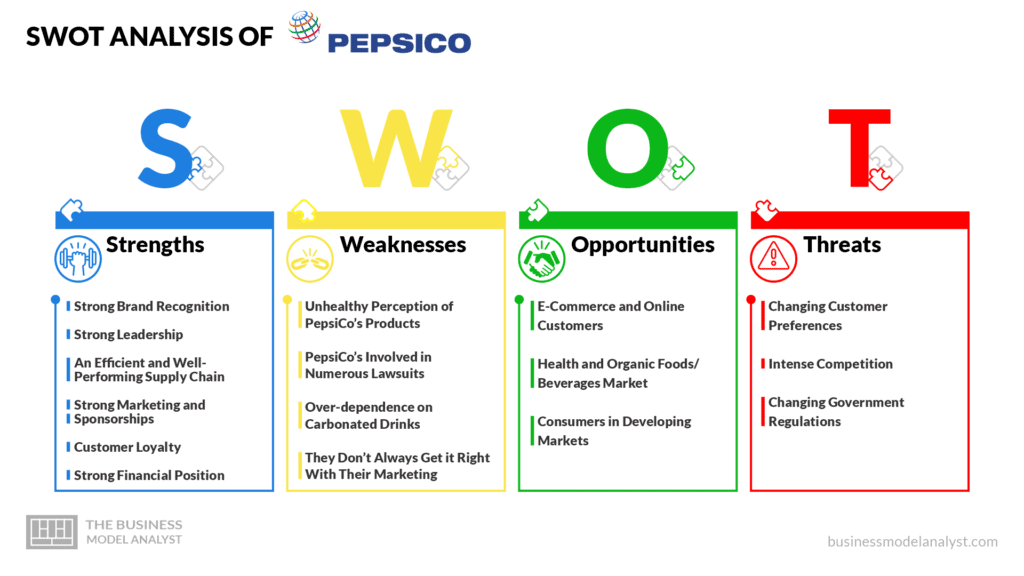PepsiCo is one of the leading food and beverage companies in the world. A typical PepsiCo SWOT analysis would highlight its strong brand awareness, which has allowed the company to soar above most of its competition. Based in New York, USA, PepsiCo is known not only for its soft drink products but its line of snacks and other food products. There are about 23 brands at PepsiCo, including popular ones like Lays, Cheetos, Ruffles, Tostitos, Gatorade, and Doritos.
Because the company has such a massive portfolio, PepsiCo employs over 309,000 employees worldwide. And to add to its impressive portfolio, this company made about $80 billion in revenue in 2021, leading to a net $7.6 billion income.
The company boasts a highly profitable business model. In this article, we’ve included a comprehensive PepsiCo SWOT analysis to highlight some of this brand’s key strengths, weaknesses, opportunities, and threats.
Contents
PepsiCo Strengths
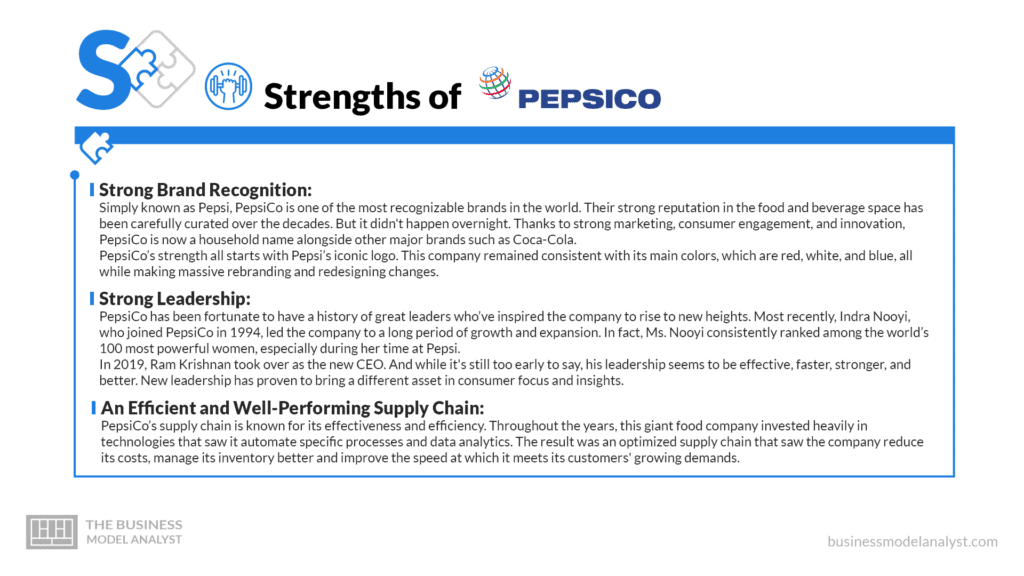
Strong Brand Recognition
Simply known as Pepsi, PepsiCo is one of the most recognizable brands in the world. Their strong reputation in the food and beverage space has been carefully curated over the decades. But it didn’t happen overnight. Thanks to strong marketing, consumer engagement, and innovation, PepsiCo is now a household name alongside other major brands such as Coca-Cola.
PepsiCo’s strength all starts with Pepsi’s iconic logo. This company remained consistent with its main colors, which are red, white, and blue, all while making massive rebranding and redesigning changes.
But it doesn’t stop there — there are plenty of factors that contribute significantly to PepsiCo’s strong brand reputation. One of these factors involves Pepsi’s impressive product lineup. Pepsi has an estimated 23 brands, each generating more than a billion dollars in revenue annually.
PepsiCo, through its sport-drink Gatorade, holds the largest share of the global sports/energy drink market in the years leading up to this one. Fritos corn chips and Lays Potato chips remain one of the most favorite snacks/food products among U.S. consumers. Its impressive and massive portfolio of food and beverage has cemented this company’s global reputation.
Strong Leadership
PepsiCo has been fortunate to have a history of great leaders who’ve inspired the company to rise to new heights. Most recently, Indra Nooyi, who joined PepsiCo in 1994, led the company to a long period of growth and expansion. In fact, Ms. Nooyi consistently ranked among the world’s 100 most powerful women, especially during her time at Pepsi.
In 2019, Ram Krishnan took over as the new CEO. And while it’s still too early to say, his leadership seems to be effective, faster, stronger, and better. New leadership has proven to bring a different asset in consumer focus and insights.
An Efficient and Well-Performing Supply Chain
PepsiCo’s supply chain is known for its effectiveness and efficiency. Throughout the years, this giant food company invested heavily in technologies that saw it automate specific processes and data analytics. The result was an optimized supply chain that saw the company reduce its costs, manage its inventory better and improve the speed at which it meets its customers’ growing demands.
An efficient supply chain is also characterized by a strong distribution network. PepsiCo has an extensive distribution network that extends beyond developed and emerging markets. It also has partnerships with various distributors, wholesalers, and retailers worldwide. This has allowed the food giant to reach a broader customer base, all while responding to changing consumer preferences and trends.
Strong Marketing and Sponsorships
Pepsi became a household name partly because of its impressive marketing campaigns. This foods and beverage giant has consistently partnered with high-profile celebrities as part of its marketing campaigns aimed at building strong emotional connections with its target audience.
For instance, football is one of the biggest attractions in the world, especially the Super Bowl and the UEFA Champions League. Pepsi has been sponsoring these events. But it doesn’t stop there; Pepsi took it a step further by endorsing high-profile celebrities and influencers such as Beyoncé, Lionel Messi, Michael Jackson, and David Beckham.
All of this has helped create a strong and recognizable brand identity for PepsiCo, which is a huge advantage in the competitive beverage industry. People associate PepsiCo with fun, excitement, and even social justice issues (like their recent “Pepsi MAX Taste Challenge” campaign, which aimed to promote diversity and inclusivity).
Customer Loyalty
Customer loyalty refers to a company having a strong base of loyal customers who consistently choose the company’s products over those of its competitors. In this case, PepsiCo has a loyal fan base of customers who repeatedly choose its products. And not only that, but its customers know how to differentiate PepsiCo’s products from the competition.
This is a really important advantage for PepsiCo because it means that they have a reliable customer base that they can count on for sales and revenue. Customers who are loyal to PepsiCo are more likely to continue buying their products, even when other options are available, which helps to maintain a steady stream of income for the company.
One way Pepsi has built this relationship with its customer base is through its marketing and celebrity-endorsed campaigns. PepsiCo has worked hard to build this loyalty by consistently providing high-quality products, engaging in effective social media ad campaigns, and responding to customer feedback.
Strong Financial Position
At the time of writing, PepsiCo had a market cap of approximately $237 billion. Not only that, but the company has consistently put out huge revenue numbers each year, establishing itself as a trailblazer in the food and beverage industry. Such numbers are huge outliers of PepsiCo’s strong financial position.
Having such a strong position financially means that PepsiCo is well-equipped to handle economic uncertainties and market fluctuation. But that’s only half of it — a robust financial position also means that PepsiCo has the financial resources to take advantage of numerous opportunities in the market, invest in R&D, lead strong marketing campaigns, and partake in product development.
To top it all off, PepsiCo has the financial means to pursue other strategic initiatives like mergers, partnerships, and acquisitions. For instance, one of the most significant deals was the acquisition of Quaker Oats Company in 2001 for $13.8 billion. Another notable acquisition by PepsiCo was the purchase of SodaStream in 2018 for $3.2 billion.
Such examples show that PepsiCo’s solid financial numbers have been a strength for the company that has allowed them to remain competitive while pursuing key strategic initiatives and optimizing the value of its shareholders.
PepsiCo Weaknesses
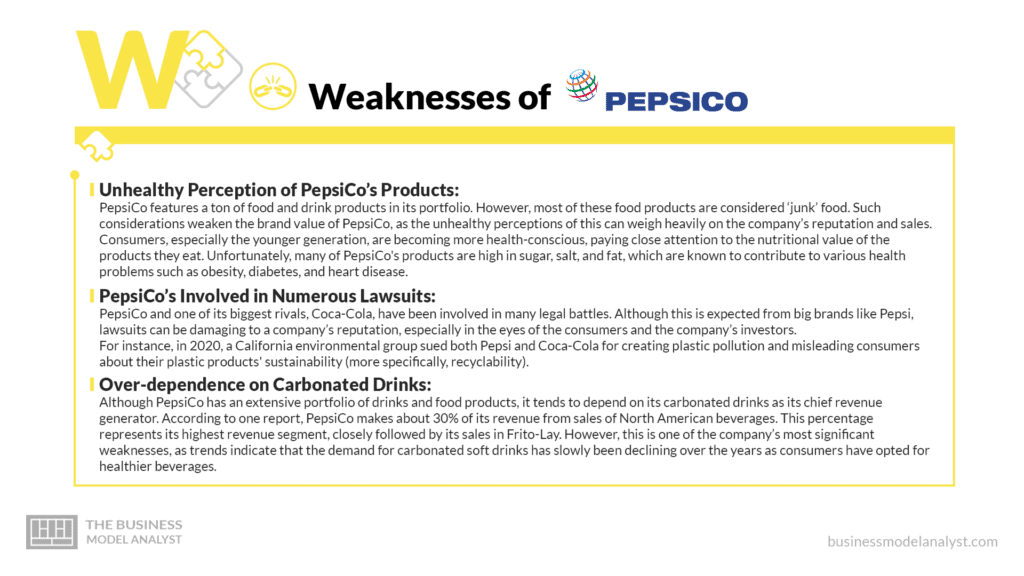
Unhealthy Perception of PepsiCo’s Products
PepsiCo features a ton of food and drink products in its portfolio. However, most of these food products are considered ‘junk’ food. Such considerations weaken the brand value of PepsiCo, as the unhealthy perceptions of this can weigh heavily on the company’s reputation and sales.
Consumers, especially the younger generation, are becoming more health-conscious, paying close attention to the nutritional value of the products they eat. Unfortunately, many of PepsiCo’s products are high in sugar, salt, and fat, which are known to contribute to various health problems such as obesity, diabetes, and heart disease.
In response to this, PepsiCo has made efforts to introduce healthier options to its food and drink lineup. These products include low-sugar and low-sodium products. The food and beverage giant has also focused on improving the nutritional profile of its existing products by reducing sugar and salt content. However, there is a lot of work that needs to be done before PepsiCo can change its harmful food and drink perceptions.
PepsiCo’s Involved in Numerous Lawsuits
PepsiCo and one of its biggest rivals, Coca-Cola, have been involved in many legal battles. Although this is expected from big brands like Pepsi, lawsuits can be damaging to a company’s reputation, especially in the eyes of the consumers and the company’s investors.
For instance, in 2020, a California environmental group sued both Pepsi and Coca-Cola for creating plastic pollution and misleading consumers about their plastic products’ sustainability (more specifically, recyclability).
Another lawsuit against PepsiCo involved claims that the company’s Naked Juice products were falsely labeled as “all-natural” when, in reality, they contained synthetic ingredients. PepsiCo ultimately settled this lawsuit for $9 million in 2013. Such cases hurt PepsiCo’s image and credibility, putting a strain between the company, its customers, and its investors.
Over-dependence on Carbonated Drinks
Although PepsiCo has an extensive portfolio of drinks and food products, it tends to depend on its carbonated drinks as its chief revenue generator. According to one report, PepsiCo makes about 30% of its revenue from sales of North American beverages. This percentage represents its highest revenue segment, closely followed by its sales in Frito-Lay. However, this is one of the company’s most significant weaknesses, as trends indicate that the demand for carbonated soft drinks has slowly been declining over the years as consumers have opted for healthier beverages.
They Don’t Always Get it Right With Their Marketing
PepsiCo has had its fair share of great marketing campaigns, but it doesn’t always go as planned for this food and beverage giant. PepsiCo’s failed marketing strategies have been a thorn in this company’s flesh, often leaving a bad taste in the mouths of its target audience.
A great example of PepsiCo’s failed marketing strategies includes the 2017 ad featuring Kendall Jenner. The ad was accused of trivializing political and social movements. It received significant backlash from consumers and critics alike. Pepsi ultimately pulled the ad and issued an apology.
These failed marketing attempts only go to highlight the importance of understanding and respecting cultural and social values. In some instances, Pepsi’s failure to do so has led to significant reputational damage for the company.
PepsiCo Opportunities
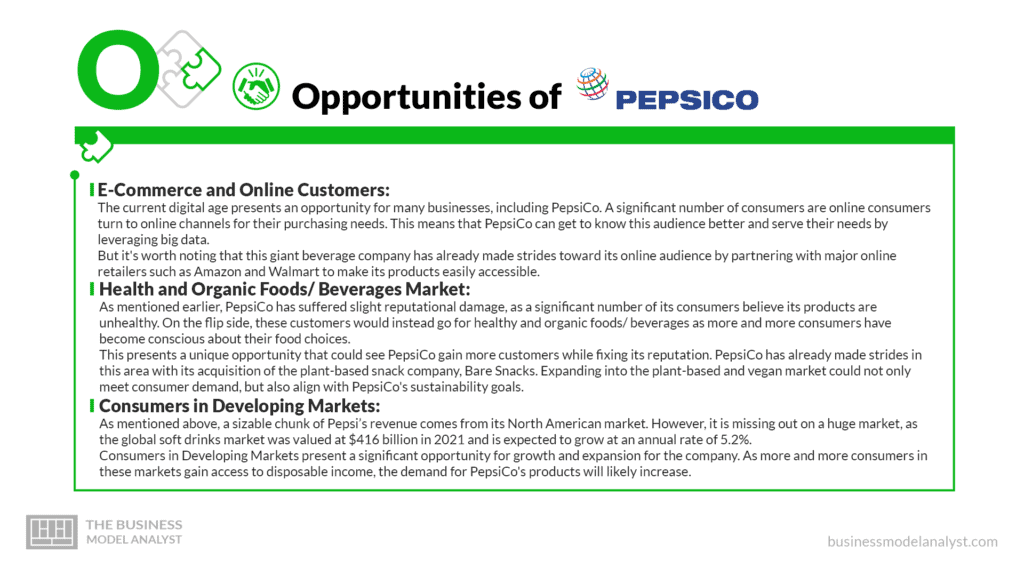
E-Commerce and Online Customers
The current digital age presents an opportunity for many businesses, including PepsiCo. A significant number of consumers are online consumers turn to online channels for their purchasing needs. This means that PepsiCo can get to know this audience better and serve their needs by leveraging big data.
But it’s worth noting that this giant beverage company has already made strides toward its online audience by partnering with major online retailers such as Amazon and Walmart to make its products easily accessible.
Health and Organic Foods/ Beverages Market
As mentioned earlier, PepsiCo has suffered slight reputational damage, as a significant number of its consumers believe its products are unhealthy. On the flip side, these customers would instead go for healthy and organic foods/ beverages as more and more consumers have become conscious about their food choices.
This presents a unique opportunity that could see PepsiCo gain more customers while fixing its reputation. PepsiCo has already made strides in this area with its acquisition of the plant-based snack company, Bare Snacks. Expanding into the plant-based and vegan market could not only meet consumer demand, but also align with PepsiCo’s sustainability goals.
Consumers in Developing Markets
As mentioned above, a sizable chunk of Pepsi’s revenue comes from its North American market. However, it is missing out on a huge market, as the global soft drinks market was valued at $416 billion in 2021 and is expected to grow at an annual rate of 5.2%.
Consumers in Developing Markets present a significant opportunity for growth and expansion for the company. As more and more consumers in these markets gain access to disposable income, the demand for PepsiCo’s products will likely increase.
PepsiCo Threats
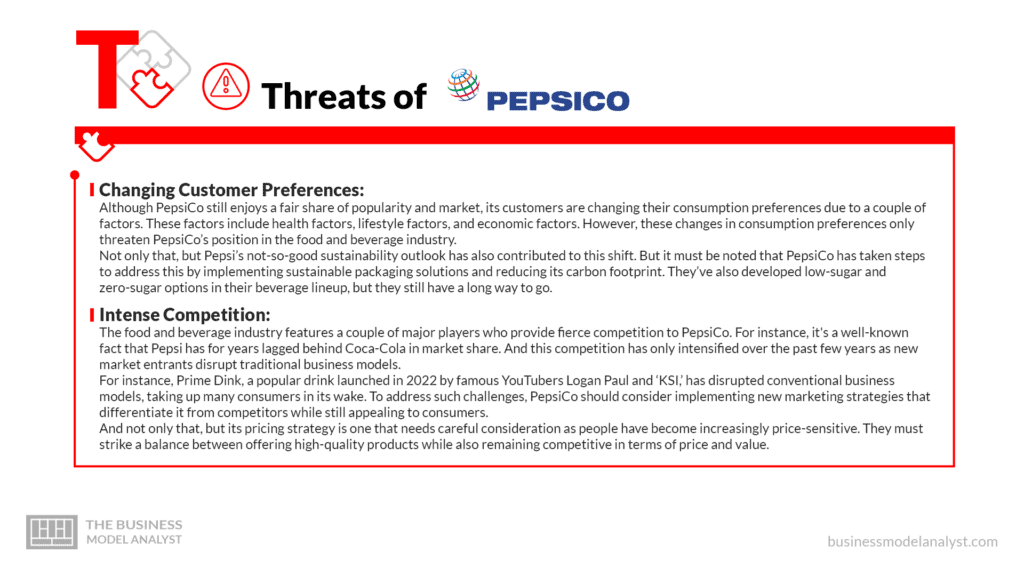
Changing Customer Preferences
Although PepsiCo still enjoys a fair share of popularity and market, its customers are changing their consumption preferences due to a couple of factors. These factors include health factors, lifestyle factors, and economic factors. However, these changes in consumption preferences only threaten PepsiCo’s position in the food and beverage industry.
Not only that, but Pepsi’s not-so-good sustainability outlook has also contributed to this shift. But it must be noted that PepsiCo has taken steps to address this by implementing sustainable packaging solutions and reducing its carbon footprint. They’ve also developed low-sugar and zero-sugar options in their beverage lineup, but they still have a long way to go.
Intense Competition
The food and beverage industry features a couple of major players who provide fierce competition to PepsiCo. For instance, it’s a well-known fact that Pepsi has for years lagged behind Coca-Cola in market share. And this competition has only intensified over the past few years as new market entrants disrupt traditional business models.
For instance, Prime Dink, a popular drink launched in 2022 by famous YouTubers Logan Paul and ‘KSI,’ has disrupted conventional business models, taking up many consumers in its wake. To address such challenges, PepsiCo should consider implementing new marketing strategies that differentiate it from competitors while still appealing to consumers.
And not only that, but its pricing strategy is one that needs careful consideration as people have become increasingly price-sensitive. They must strike a balance between offering high-quality products while also remaining competitive in terms of price and value.
Changing Government Regulations
Much like any other industry, the food and beverage industry is subject to government regulations. These regulations often impact the way a business conducts its operations but are generally designed to protect the public. However, they can pose a significant threat to PepsiCo.
For instance, nutritional labeling regulations compel food companies like Pepsi to provide more detailed nutritional information on their products. This could have a damaging effect on the company, as Pepsi’s products are not necessarily the healthiest. Also, they’ve had to invest in technology and processes to ensure that they are able to provide accurate nutritional information to consumers.
The list of government regulations affecting Pepsi is endless. There are marketing, environmental, and labor regulations, all of which could potentially spell disaster for the giant food and beverage maker.
Conclusion
PepsiCo is one of the largest food and beverage companies in the world. The giant food and beverage manufacturer boasts a market cap of approximately $237 billion at the time of writing. They achieved this feat by running effective marketing campaigns, garnering a lot of consumers by building a strong brand image, and leveraging a multitude of different foods and drinks.
However, this has come at the cost of many lawsuits, questionable sustainability practices, and intense competition from other giants in Coca-Cola, Red Bull, and Kellogg. However, opportunities in developing markets, the e-commerce sector, and the growing health and organic markets give PepsiCo an opportunity to stay ahead of the competition while gaining many customers worldwide.


